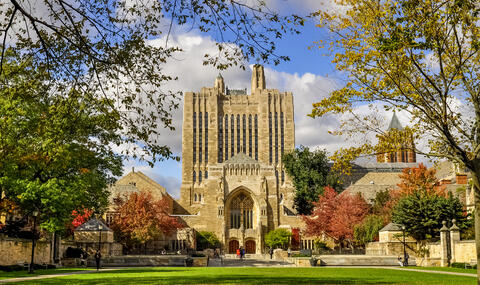Reckoning with Slavery in US Intellectual History and in the University

As a prelude to the release of the book based on the work of the Yale and Slavery Research Project, this panel discussion focuses on how elite universities, their founders, and faculty over time, have used, benefitted from, and understood the story of enslavement in the North America. It also examines how successive generations of historians have written and re-written the story of slavery in relation to the nation and its origins. This includes debates over enslavement as lived experience, as migration, as a massive political and economic problem, and as a question of memory and redress, among other topics. Speakers will address the many questions at the heart of the problem of how universities are attempting to face their past, especially in relation to race and slavery. The program will be moderated by David Blight, who has led the Yale and Slavery Research Project and is the principal author of Yale and Slavery: A History (Yale University Press, February 2024).
Moderator:
David W. Blight (Director, Gilder Lehrman Center for the Study of Slavery, Resistance, and Abolition; Sterling Professor of History, Yale University)
Speakers:
· Leslie Harris, Professor of History at Northwestern University; author of In the Shadow of Slavery: African Americans in New York City, 1626-1863 (University of Chicago Press, 2003); co-editor (with James T. Campbell and Alfred L. Brophy, of Slavery and the University: History and Legacies (University of Georgia Press, 2019); and co-founder and co-leader (from 2003 to 2012) of Emory University’s Transforming Community Project, which addressed the question of how predominantly white institutions of higher learner can and should re-think their missions in light of long legacies of racial inequality.
· Scott Spillman, Gilder Lehrman Center Postdoctoral Associate, Fall 2023; and author of the forthcoming book: “Making Sense of Slavery: An American History,” which argues that justifications for and critiques of slavery are central to the development of U.S. intellectual history.
· Rachel L. Swarns, Professor of journalism at New York University; contributing writer for The New York Times; and author of The 272: The Families Who Were Enslaved and Sold to Build the American Catholic Church (Random House, 2023), which tells the story of Georgetown University, its early history in relation to slavery and its struggle to reckon with discoveries of its past.
· Craig Wilder, Barton L. Weller Professor of History at the Massachusetts Institute of Technology; and author of numerous books, essays, and articles, including Ebony and Ivy: Race, Slavery, and the Troubled History of America’s Universities (Bloomsbury, 2013), the most influential book on the history of how universities evolved in relation to slavery.